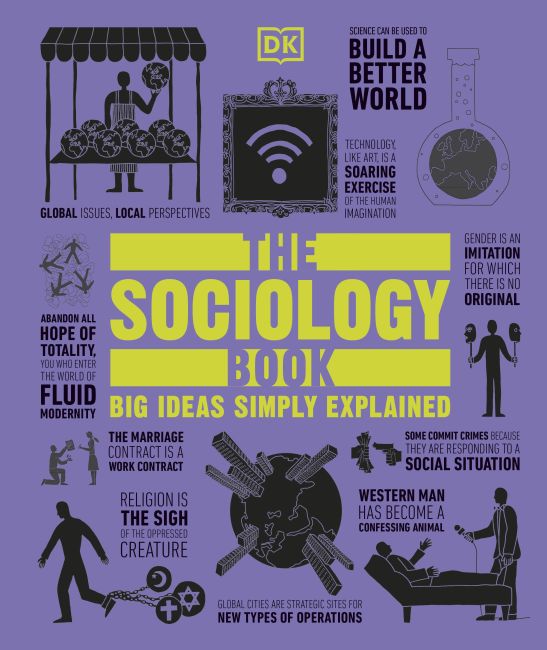Imagine a bustling city street, filled with individuals from all walks of life. Each person carries their own story, their own motivations, their own struggles. How does this complex web of human interaction function? How do individuals shape, and are shaped by, the communities around them? This is the essence of sociology, the study of human society and how it works.

Image: www.dk.com
Sociology is not merely an academic discipline; it’s a lens through which we can better understand the world around us, from the intimate dynamics of families to the vast forces shaping global inequality. It equips us to recognize patterns in human behavior, decode cultural influences, and grapple with the social challenges of our time. This encyclopedia aims to guide you through the fundamental concepts, influential theorists, and diverse perspectives that define this fascinating field.
The Genesis of Sociology: A Search for Understanding
Sociology’s roots lie in the transformative upheavals of the 18th and 19th centuries. The Industrial Revolution, urbanization, and the rise of capitalism created unprecedented social changes, prompting thinkers to analyze these shifts and their impact on human life. Early sociologists like Auguste Comte, Karl Marx, and Émile Durkheim sought to understand the forces driving social order and societal change.
Comte, considered the “father of sociology,” coined the term “sociology” and emphasized the scientific study of society. Marx, focusing on the clash between economic classes, argued that societal conflict was the engine of history. Durkheim, a pioneer of social methodology, explored the role of social facts and the collective consciousness in shaping individual behavior.
Key Concepts: The Building Blocks of Sociological Thought
Sociology is built upon a foundation of core concepts that provide a framework for examining social phenomena. Some of the most fundamental include:
- Social Structure: The intricate network of relationships, institutions, and organizations that shape our lives. It encompasses hierarchies, power dynamics, and social norms, influencing our behavior and opportunities.
- Socialization: The process through which individuals learn the norms, values, and behaviors of their society. From childhood to adulthood, we internalize social expectations, shaping our identities and shaping our interactions.
- Culture: The shared beliefs, values, customs, and practices that distinguish one group of people from another. Culture provides a blueprint for social life, influencing everything from language and art to food and rituals.
- Social Inequality: The uneven distribution of resources, power, and opportunities across different groups in society. It encompasses various forms of discrimination, including racial, gender, and economic inequality, leading to disparities in access to education, healthcare, and wealth.
Perspectives: Viewing Society Through Different Lenses
Sociology is not a monolithic field, but rather a diverse array of perspectives, each offering a unique angle on social phenomena.
- Functionalism: This perspective emphasizes the interconnectedness of society, viewing social institutions as serving vital functions to maintain social order and stability. It likens society to a living organism, with each part contributing to the overall health of the system.
- Conflict Theory: This perspective highlights the inherent tensions and conflicts within society, focusing on power struggles between social groups and the unequal distribution of resources. It emphasizes social change driven by these conflicts, with the potential for social transformation through revolution or social movements.
- Symbolic Interactionism: This perspective emphasizes the role of symbols and communication in shaping social interaction. It analyzes how individuals interpret and negotiate meaning through everyday interactions, highlighting the importance of shared understandings and cultural contexts.
- Feminist Sociology: This perspective examines gender relations and the impact of gender on social structures, inequalities, and experiences. It challenges traditional gender roles and power imbalances, advocating for social justice and equality.

Image: booksrun.com
Applying Sociology: Understanding our World
The insights gleaned from sociology have far-reaching implications for understanding and addressing contemporary social challenges:
- Social Movements: Sociology provides a framework for analyzing the dynamics of social movements, revealing how collective action arises from grievances, shared ideologies, and the mobilization of resources.
- Globalization: Sociology helps us grapple with the implications of globalization, examining its effects on national identity, labor markets, and the global distribution of wealth.
- Technology and Society: Sociology explores the impact of rapidly evolving technologies on social relationships, work, and the very fabric of society, prompting discussions about privacy, ethics, and digital divides.
- Environmental Sociology: This field examines the relationship between human societies and the natural world, analyzing environmental problems in a sociocultural context and exploring how social factors contribute to environmental degradation.
Beyond the Textbook: Actionable Insights
One of the most powerful aspects of sociology is its potential to empower individuals to become active agents of social change. By understanding the social forces at play and recognizing patterns in collective behavior, we can:
- Become More Aware: Develop a critical awareness of the social factors shaping our experiences, challenging assumptions and recognizing biases.
- Engage in Dialogue: Facilitate meaningful conversations about social issues, bridging divides and fostering understanding between different perspectives.
- Promote Social Justice: Advocate for policies and initiatives that address social inequalities and promote equality and fairness within society.
Encyclopedia Of Sociology
The Power of Sociological Thinking
Sociology offers a powerful tool for navigating the complexities of the human experience. By delving into the intricate web of social relationships, exploring diverse perspectives, and analyzing social forces, we gain valuable insights into the world around us. With a deeper understanding of society, we can become more informed citizens, empowered to address social challenges and create a more just and equitable future.






